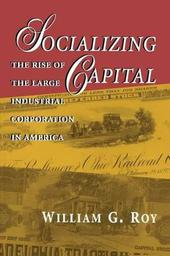
|
Socializing Capital: The Rise of the Large Industrial Corporation in America
Paperback / softback
Main Details
| Title |
Socializing Capital: The Rise of the Large Industrial Corporation in America
|
| Authors and Contributors |
By (author) William G. Roy
|
| Physical Properties |
| Format:Paperback / softback | | Pages:360 | | Dimensions(mm): Height 229,Width 152 |
|
| Category/Genre | Political economy
Ownership and organization of enterprises |
|---|
| ISBN/Barcode |
9780691010342
|
| Classifications | Dewey:338.740973 |
|---|
| Audience | | Professional & Vocational | | Tertiary Education (US: College) | |
|---|
| Illustrations |
8 line illus.
|
|
Publishing Details |
| Publisher |
Princeton University Press
|
| Imprint |
Princeton University Press
|
| Publication Date |
21 July 1999 |
| Publication Country |
United States
|
Description
This text constructs a historical inquiry into the rise of the large publicly traded American corporation. Departing from the received wisdom, which sees the corporation as the result of technological development and market growth that required greater efficiency, the book focuses on political, social and institutional processes governed by the dynamics of power. The author shows how the corporation started as a quasi-public device used by governments to create and administer public services like turnpikes and canals and then how it germinated within a system of stock markets, brokerage houses and investment banks into a mechanism for the organization of railroads. Finally, and most particularly, the author analyzes its flowering into the realm of manufacturing, when, at the turn of the century, many of the same giants that still dominate the American economic landscape today were created.
Author Biography
William G. Roy is Professor of Sociology at the University of California, Los Angeles. He specializes in large-scale political and economic transformations.
ReviewsOne of Choice's Outstanding Academic Titles for 1997 "Socializing Capital is a shining example of the 'new economic sociology.' Roy's question is bold because it challenges the economic orthodoxy that the modern corporation arose because of its efficiency. His answer is creative because it weaves together insights from power and institutional perspectives to revise the history of the modern corporation."--Frank Dobbin, Contemporary Sociology "William G. Roy's ambitious book about the ascendancy of the large industrial corporation in the United States sheds new light on a complex and timely subject... Socializing Capital is a significant scholarly work, rich in detail, that makes important contributions to the historical study of corporate power."--Scott R. Bowman, American Journal of Sociology "Richly detailed, this book builds on the significant work of historians, economists, and social scientists who have dominated the field of business history for a generation or more. It is a major contribution... "--Choice
|